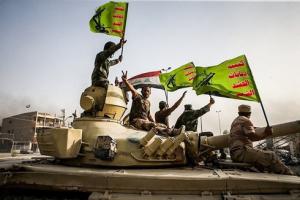ISISISIS ranks in Syria, Iraq “decimated,” with only 15,000 fighters left: U.S. commander
The number of ISIS fighters in Iraq and Syria has been substantially reduced by an effective U.S.-led military campaigns, leaving as few as 15,000 militants to fight, a senior U.S. commander said. Not only has the estimated number of ISIS fighters shrunk from earlier estimates of between 19,000 and 25,000, but the U.S. commander said that the quality of ISIS fighters has decreased. “The enemy is in retreat on all fronts,” Lieutenant General Sean MacFarland said.

Celebrating the liberation of Fallujah // Source: commons.wikimedia.org
The number of ISIS fighters in Iraq and Syria has been substantially reduced by an effective U.S.-led military campaigns, leaving as few as 15,000 militants to fight, a senior U.S. commander said.
Lieutenant General Sean MacFarland said the total number of ISIS militants left to fight in both countries was difficult to measure accurately, but that evidence suggests that the number of ISIS fighters in both countries was between 15,000 and 20,000.
CNBC quotes MacFarland to say that 45,000 ISIS fighters are no longer on the front line after U.S.-backed operations.
Not only has the estimated number of ISIS fighters shrunk from earlier estimates of between 19,000 and 25,000, but the U.S. commander said that the quality of ISIS fighters has decreased.
“The enemy is in retreat on all fronts,” MacFarland told AP.
“All I know is when we go someplace, it’s easier to go there now than it was a year ago. And the enemy doesn’t put up as much of a fight,” he said.
MacFarland said that Iraqi forces were prepared to take the northern city of Mosul from ISIS. The second largest city in Iraq has been under ISIS control since 2014.
MacFarland said the Syrian Democratic Forces group was within weeks of defeating ISIS in Manbij, Syria. The city, he said, was largely in the hands of the SDF and the pockets of enemy resistance were shrinking daily.
“I don’t give it very long before that operation is concluded, and that will deal a decisive blow to the enemy,” he said, while adding there were still a lot of enemy foreign fighters putting up resistance.
MacFarland cautioned that while there had been successes in both countries, Isis would continue to be a threat.
“Military success in Iraq and Syria will not necessarily mean the end of Daesh [ISIS],” he said. “We can expect the enemy to adapt, to morph into a true insurgent force and terrorist organization capable of horrific attacks like the one here on 3 July in Baghdad and those others we’ve seen around the world.”
